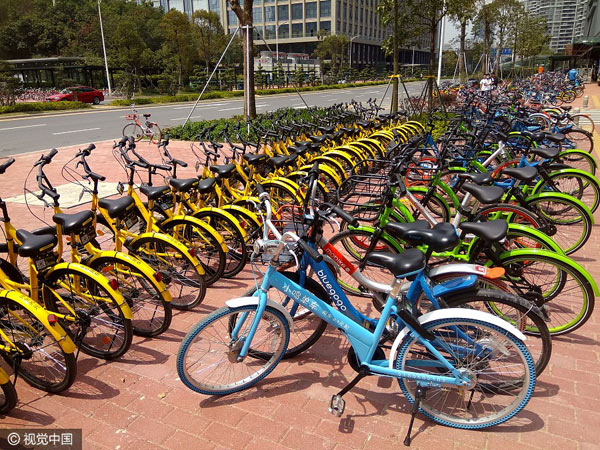Alipay app unlocks 6 bike-sharing services
 |
|
Various bicycles are parked at a subway entrance in Shenzhen, Guangdong province, April 4, 2017. [Photo/VCG] |
The 450 million users of Alipay can now access the bike-sharing services of the companies — ofo, Bluegogo, Youon, Hellobike, funbike and U-bicycle — via its mobile app, to keep from having to download each company's app and pay deposits in order to ride.
The service is available in 50 cities and connects Alipay with about 6 million bikes, over half of all the shared bikes in China, Ant Financial, owner of Alipay, said in a statement.
The move is a counterpunch to WeChat, the messaging-to-payment app that inked a similar deal with bike-sharing company Mobike in March. Alipay and WeChat are locked in fierce competition to win the offline payment market.
"This saves a lot of space on my smartphone and reduces the time to look for targeted bicycles, for I can choose six types of bikes now," said Zhang Wentao, a Beijing bank worker. He deleted three other bike-sharing apps on his phone.
Under the partnership,Alipay will also provide insurance for each rider who accesses the service via its app.
Many college students and even professionals in China are returning to bicycles as a favorite transportation tool for short-distance travel, and a number of startups are scrambling to enable users to borrow and return bikes virtually anywhere at anytime.
Archrivals ofo and Mobike are backed respectively by Ant Financial and Tencent, which owns WeChat.
Zhang Xu, a transportation analyst at Beijing-based Analysys, said WeChat and Alipay hope the alliances will expand the offline use of their mobile payment services.
"For ofo and Mobike, the deals can accelerate their growth by tapping into tech heavyweights' sizable user bases. But the impact is not decisive. The battle for supremacy still hinges on their bikes' availability and quality," Zhang said.
Customers who use the six companies' own apps can still choose WeChat as the payment tool, Zhang said.
The mounting competition also comes as governments in Beijing and Shanghai are mulling plans to better regulate and facilitate the industry. The plans include capping the number of shared bikes, forbidding children under 12 from riding shared bikes and requiring the bikes to have GPS devices.
Zhou Zhengyu, head of the Beijing Municipal Commission of Transport, said consumers like the services, which cultivate bicycle enthusiasts. But curbs are needed as some streets and sidewalks become overloaded with bikes.
















